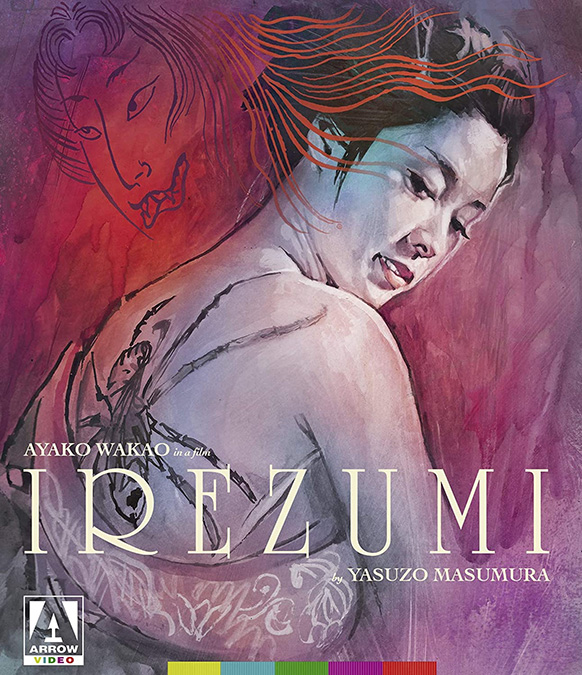Knowing that their families won’t approve of their relationship, Otsuya (Ayako Wakao) and her lover Shinsuke (Akio Hasegawa) elope one wintry night. While waiting for a blessing -and some cash- from her father, Otsuya is kidnapped and sold to a geisha house and her beau is nearly murdered by a goon hired by the man who was supposed to be their friend. Before you can say “human trafficking”, Tokubei (Asao Uchida), Otsuya’s conniving pimp, hires a master tattoo artist to give her a tattoo of a huge black widow spider on her back. He believes that this sick tatt will inspire her to bleed her clients dry and he’ll reap the rewards. But the bitchin’ ink works all too well as Otsuya soon begins to embody the frightening image emblazoned on her back.
While technically a drama, Irezumi is as close to being a horror movie as it can thanks to its brooding atmosphere and monstrous characters that barely pass as human beings. This film’s grim tone is no surprise since it comes from Yasuzô Masumura, director of Blind Beast (1969), one of the most harrowing and darkly kinky films of the 1960s, and writer Kaneto Shindô, who gave the world two horror masterpieces, Onibaba (1964) and The Black Cat (1968). Even though this film is quite tame regarding its depiction of onscreen sex and nudity, it has no shortage of a sort of horny malaise that settles over nearly all of its running time. On a personal note, “horny malaise” is a phrase that I’ve been wanting to type for the last decade or so but was too afraid to even attempt to consider saying publicly… until now!
The cast of this film (that no one ever called “a laugh riot” or a “feel-good picture”) are all top notch but this is Ayako Wakao’s show all the way. She really masters portraying a character that you feel pity for but who you also would not trust in a million years. Otsuya goes from a freewheeling goofus, who likes to feign being naïve until it gets her into trouble, to a cold-blooded dickhead so quickly that it immediately makes you wonder if the tattoo really does have some supernatural power. Also, all of the men are either completely terrible or total cowards or both. So it’s just like real life!
Irezumi is a triumph of hypnotic beauty thanks to the cinematography of Kazuo Miyagawa, who lensed freakin’ Rashomon (1950), and an eerie music score by frequent Masumura collaborator Hikaru Hayashi. But of course, a tale of ruined lives as lurid as this just has to get ugly. When the violence goes down in Irezumi, don’t expect a blood ballet of precise swipes of a samurai’s sword. What you get instead is ugly and brutal death and the painful reality that when it comes to knives and swords, human beings are notoriously stubborn when facing their own mortality. If you love period melodramas and you really hate people, then Irezumi is a film for you.
Arrow’s Blu-ray of Irezumi is quite amazing. The film has been gloriously restored and looks utterly gorgeous in its 2.35:1 aspect ratio. The Japanese audio (with accompanying English subtitles) is in mono, as it was originally intended, but the mix sounds so good that you’re going to call your estranged parents and tell them all about it. They might even forgive you for bringing so much shame to your family. (No, they won’t.)
I really enjoy the introduction by Japanese cinema expert Tony Rayns and the audio commentary by Japanese film scholar David Desser. Both provide context to not only who made the film, they also discuss the bizarre short story by Jun’ichirô Tanizaki that provided the source material for Irezumi. Another great extra is the visual essay by Asian cinema scholar Daisuke Miyao, who goes for a deep dive into the use of color and light in the film. The original trailer for Irezumi is also on the disc. Highly recommended.

